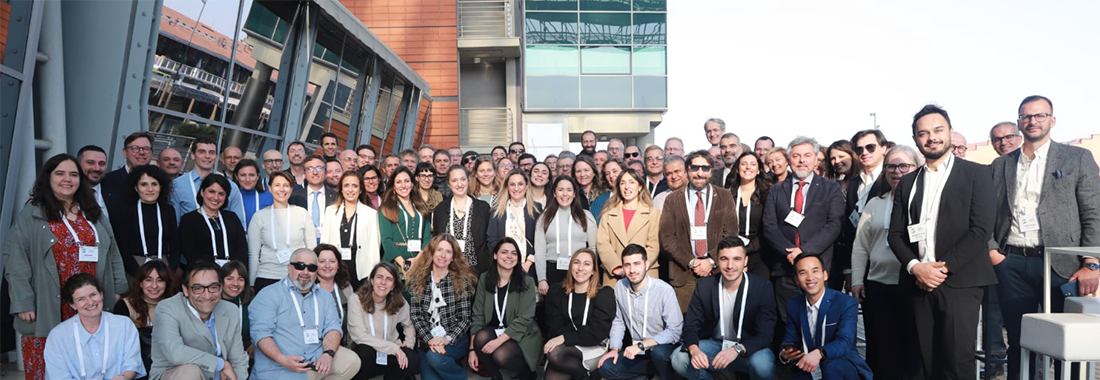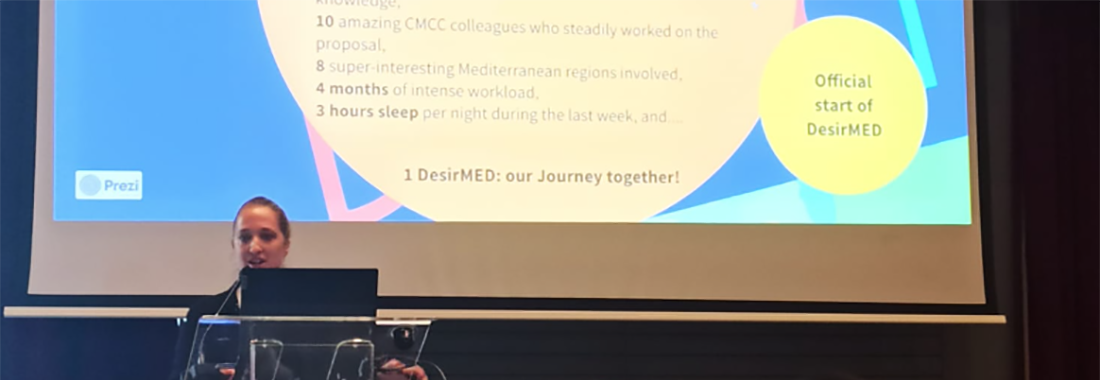Last month, the historic city of Venice hosted the first meeting of DesirMED, a project funded by the HORIZON Europe program aimed at addressing one of the most pressing challenges of our time: adapting to climate change in the Mediterranean region. DesirMED seeks to enhance the adaptive capacities of leaders and communities through the implementation of nature-based solutions (NBS). This approach focuses on the use of natural resources and ecosystems to mitigate the effects of climate change while promoting biodiversity and the well-being of local communities.
The project involves the implementation of adaptation strategies in five demonstration areas - including Sardinia - and three replicating areas, involving a wide network of scientific and institutional partners. The goal is to transform climate adaptation from an abstract concept into concrete and measurable action that can serve as a model for other areas of the world.
At the meeting on February 20-21, 2024, hosted by the CMCC, the Euro-Mediterranean Center for Climate Change, the MEDSEA Foundation participated along with the Autonomous Region of Sardinia (RAS), the National Research Council (CNR), the IMC International Marine Center Foundation, and Criteria. Together, we will work to address the impacts of climate change in coastal areas, with a particular focus on Sardinia, a demonstration site of DesirMED.
The nature-based solutions to be explored and implemented include the protection and restoration of marine and coastal ecosystems, the promotion of sustainable agriculture, and the integrated management of water resources. These actions aim not only to reduce the vulnerability of communities and ecosystems to climate change but also to create sustainable economic opportunities.
The first meeting of DesirMED marks the beginning of an ambitious and necessary journey. DesirMED stands as an example of how international cooperation, combined with innovation and local commitment, can lead to effective and sustainable solutions for one of the most urgent problems of our time.
Latest news

REST COAST, at the annual meeting in Groningen, demonstrates the effectiveness of natural restoration of aquatic systems
The standstill of the Nature Restoration Law, the European law on nature restoration, stalled in its final approval phase in the Council due to the hesitations of some Member States, has…

TransformAr makes a stop in Finland for the sixth Consortium Meeting
In mid-April, the sixth Consortium meeting of the H2020 TransformAr Project was held in Lappeenranta, recognized as the Climate Capital of Finland. This city truly exemplifies sustainability, with 100% of waste recycled and all…

Launch of the PLASTRON Project in Genoa: A Cross-Border Initiative for the marin Plastic & Paper Recycling
The PLASTRON project is about to start. With the goal of improving the sustainability of local communities by providing knowledge and tools for collecting and transforming plastic from the coast…

Wetland4Change to Address Climate Change with Wetlands, Kickoff in Sofia
Last week, hosted by the University of Forestry in Sofia, the kickoff of "Wetland4Change" took place, marking the start of an ambitious Interreg Euro-MED project within the Natural Heritage Mission aimed at…

The Capo Carbonara Marine Protected Area towards a New Zoning with Blue4All
A new co-management model to reorganise marine protected areas, benefiting from all the tools and knowledge provided by the Blue4All project will be soon implemented in Sardinia. Later last month, preliminary meetings…

TransformAr, Adaptation Pathways to Climate Change for Fishing Validated, All Set for Sensor Installation
TransformAr enters its most operational phase at the pilot site in Oristano where, in March, the MEDSEA team met with the Municipality of Terralba and the fishermen of the San Giovanni Lagoon from the Marceddì Consortium to…

Revitalizing the Mediterranean: ARTEMIS Project Unites Environment and Innovation
March marked the launch of "Artemis", a project of the Interreg Euro-MED Programme that seeks to combine the ecological benefits of seagrass with innovative financial strategies, such as Payment for Ecosystem…

Petit Noirs: From Senegal to Arborea to Combat Illegal Immigration with Mussel Farming
Sustainable mussel farming in Arborea becomes an international example with a project linking Dakar, Senegal, with Sardinia, aiming to combat illegal immigration and generate economic opportunities.

The Charm of Wetlands in Sardinia: Over a Thousand Visitors in the World Wetlands Day Event Calendar in Sardinia"
With over 30 events, from January 27 to March 10, 2024, the MEDSEA World Wetlands Day in Sardinia comes to a close. The initiative, which falls in the month when wetlands are…

First Meeting of the DesirMED Project in Venice: A Step Forward in Climate Adaptation in the Mediterranean
Last month, the historic city of Venice hosted the first meeting of DesirMED, a project funded by the HORIZON Europe program aimed at addressing one of the most pressing challenges of…

Sails Towards the Future: The UniCa Sailing Team and the Challenge of Eco-Sustainable Boats in Sardinia
In Sardinia, circular and low-impact solutions for water sports and sailing are being studied. The University of Cagliari, together with the UniCa Sailing Team, is working on the construction of an…

The first General Assembly kicked off in Lecce: for a more resilient MPAs network
The first General Assembly of the "Blue 4 All" project took place in Lecce from January 23 to 26, 2024. The event, hosted by the CMCC Climate - Euro-Mediterranean Center on Climate…

It's Time to Celebrate Wetlands: join World Wetlands Day Sardegna 2024
In Sardinia, February is the month of wetlands! We celebrate World Wetlands Day on the occasion of February 2nd, which marks the 53rd anniversary of the establishment of the RAMSAR Convention for…

TransformAR Reaches Halfway: The Progress in the San Giovanni Lagoon
TransformAR, at the pilot site of Marceddì-San Giovanni (Terralba) in Sardinia, one of the six demonstration sites of the project, is gaining momentum. The project, which develops transformative adaptation solutions to climate change…

MEDSEA reforestation phase in Sennariolo for the "Hope for Sennariolo" campaign has officially begun
As announced last summer, the MEDSEA reforestation phase in Sennariolo, Sardinia, for the "Hope for Sennariolo" campaign has officially begun. The small village of Montiferru in Sardinia, in July 2021, following a major fire…

We're gearing up for the month of ponds in Sardinia with #WWDSardegna: registrations open until January 21th!
At MEDSEA, we're gearing up as we do every year for the month dedicated to ponds and lagoons: February. World Wetlands Day, or the Global Day of Wetlands, is celebrated annually…
- 1
- 2
- 3
- 4


